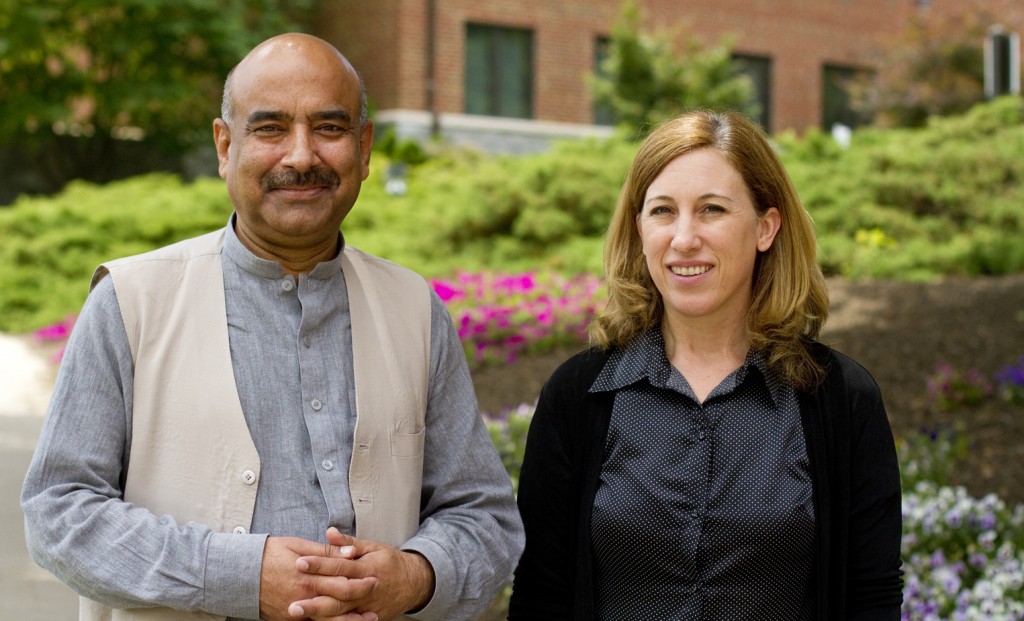One might reasonably expect Lisa Schirch, a research professor with EMU’s Center for Justice and Peacebuilding (CJP), to believe that the best the American military can do in Afghanistan is simply get out of Afghans’ way as they rebuild their country. That American military and diplomatic leaders would be calling her regularly, eager to learn more about her perspective on the matter, however, comes as more of a surprise.
As the founder and director of 3P Human Security, Schirch has worked for the past seven years to encourage U.S. government agencies to protect humanitarian space while embracing conflict prevention and peacebuilding principles. The project has progressed rapidly over the past year, as her strong relationships with military and civilian leaders have resulted in invitations to teach civil society peacebuilding concepts nearly weekly at the Pentagon, West Point, the U.S. Army War College and elsewhere.
“The quantity and quality of our relationships with the U.S. State Department, USAID, [the] Department of Defense and the Foreign Service Institute grew exponentially during the last year,” Schirch wrote this spring in a report for the Rockefeller Brothers Foundation, a funder of 3P’s work.
Over the past year, Schirch also taught a course on Afghan civil society to nearly 1,000 foreign service officers, published several reports and book chapters for government audiences, and testified before Congress. Schirch noted that while she’s developed close relationships with American military and diplomatic leaders, she does not support many of the policies they now pursue.
“Building relationships is an essential part of peacebuilding,” she says. “The most important negotiations and diplomacy happen with people you disagree with.”
Schirch founded 3P (which stands for Partners for Peacebuilding Policy) Human Security during a sabbatical in 2005, after exploring ways that CJP could relate to policy-makers in Washington, D.C. She recognized opportunity to engage both the peace community, which often was simply opposing the wars in Iraq and Afghanistan without offering viable alternatives, as well as the military, which was flailing in its attempts at “state-building” in those countries.
In the years since, 3P has worked with other peace organizations to better define and understand “security” while working with the military to imagine alternatives to the way it has carried out its missions overseas. While her short-term goal with 3P is to persuade the military and state department to recognize, support and protect the ability of Afghans and Iraqis to rebuild their own countries, her long-term goals are grander in scope.
“We have to conceive of ‘security’ in a totally new way,” Schirch says. This involves exploring what the concept of “security” means to people, what conditions are necessary for them to experience it, and how – or if – the military has a role in creating or protecting those conditions. These exercises then lead to bigger questions about pacifism, and whether the use of force is an appropriate intervention during security crises, and what kind of force, exactly, would be appropriate. A related set of questions involves what sorts of changes to the country’s budgetary priorities and military-industrial complex would allow the military to embrace peacekeeping rather than aggression as its primary role – all work that has proven both exciting and exhausting for Schirch over the past seven years.
“Lisa helped shape the thinking of a lot of people who are in Afghanistan and Iraq on the role that indigenous civil society groups can play in facilitating conflict prevention or stabilization,” says John Agoglia, vice-president for operations and government services with IDS International, a national security consulting firm. “She is definitely one of the innovators [in that field].”
Agoglia is a retired U.S. Army colonel who directed the Army’s Peacekeeping and Stability Operations Institute in Pennsylvania and the Counterinsurgency Training Center in Kabul, Afghanistan. He has worked with Schirch for years, both as an officer and a civilian.
After operating under the structure of CJP since 2005, 3P shifted its organizational affiliation as of July 1, 2012, to the Alliance for Peacebuilding, a coalition of peacebuilding practitioners based in Washington, D.C. While grant funding for 3P’s work will now flow through the Alliance for Peacebuilding rather than CJP, there will be no practical change to Schirch’s role and presence at EMU, where she will remain based as a research professor. She will also continue to teach one class each year at its Summer Peacebuilding Institute.
Through October 2012, Schirch is taking an unpaid sabbatical to focus on rest and renewal. She is pursuing her interest in the visual arts as the artist-in-residence at CJP. She hopes her example will help to “normalize” rest-taking and breaks in a field where people “all talk about self-care a lot, but don’t do a very good job of it.”
“When you work in war zones, you lose people who you work with,” she says. “Grief and trauma are a part of working to build peace in places where there is great tragedy.”
She also said the experience of developing strong working relationships with military leaders, with whom she still holds sharply divergent convictions about war, violence and justice, has become a mounting stress she hopes to alleviate during her sabbatical.
Schirch’s art itself will have a dual “3P” motif, both in its media – painting, photography and pottery – and subject matter – parenting, parks and poetry. Her sabbatical will culminate with an art show on campus that will open on Nov. 3.
“Beauty is the opposite of violence, and that’s the theme of my art show,” she says.
